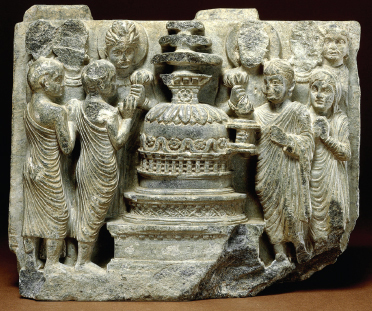Individuals in Society: Sudatta, Lay Follower of the Buddha

During the decades when the Buddha traveled around north India spreading his teachings, he attracted both disciples and lay followers. Stories of the Buddha’s interactions with them were passed down orally for centuries, and undoubtedly were elaborated over time. Still, these accounts give us a sense of what life was like in early India. The wealthy banker or merchant Sudatta is a good example of an ardent lay follower. He was so generous to others that he is normally referred to by his epithet, Anathapindada, which means “benefactor of the needy.”
Sudatta met the Buddha in the first year after his enlightenment. In one early conversation with him, Sudatta asks if he must leave the world to attain nirvana:
Now, I have heard thy disciples praise the bliss of the hermit and denounce the unrest of the world. “The Holy One,” they say, “has given up his kingdom and his inheritance, and has found the path of righteousness, thus setting an example to all the world how to attain Nirvana.” My heart yearns to do what is right and to be a blessing unto my fellows. Let me then ask you, Must I give up my wealth, my home, and my business enterprises, and, like you, go into homelessness in order to attain the bliss of a religious life?
The Buddha replied that the crucial issue was the way an individual looked on wealth. Anyone who cleaves to wealth needs to cast it aside, but anyone who “possessing riches, uses them rightly, will be a blessing unto his fellows.” It is cleaving to wealth and power that enslaves people, not the mere possession of wealth. Artisans, merchants, or officers of the king who stay in the world should concentrate on performing their duties well. “If they live in the world not a life of self but a life of truth, then surely joy, peace, and bliss will dwell in their minds.”*
Sudatta purchased a large park to provide a place where the Buddha and his disciples could live during the rainy season and had many buildings built there. The Buddha returned to this Jetavana Monastery many times and frequently gave sermons there. Sudatta also provided food for monks and gave generously to the poor and needy. As a result of his generosity, Sudatta was gradually reduced to poverty himself. Then, through divine intervention, those who owed him money returned it, making him wealthy once again.
Stories recounted that Sudatta’s family, including his three daughters, became pious followers. Although Sudatta’s son initially resisted the Buddha, he eventually became a generous patron himself. The Buddha himself helped convert Sudatta’s unpleasant daughter-
Sudatta died before the Buddha. A sutra that survives purports to be the sermon two of the Buddha’s chief disciples preached to him on his deathbed. They counseled Sudatta on how to face his situation by training himself to decide not to cling to what is seen, heard, sensed, thought, attained, sought after, or pondered by the intellect.
QUESTIONS FOR ANALYSIS
- What can you infer about the circumstances of the early followers of the Buddha from the life of Sudatta?
- What insights does the life of Sudatta provide into the ways faith in Buddhism was spread?

DOCUMENT PROJECT
What made Buddhism accessible to everyone? Read a selection of Buddhist parables, and then complete a quiz and writing assignment based on the evidence and details from this chapter. See Document Project for Chapter 3